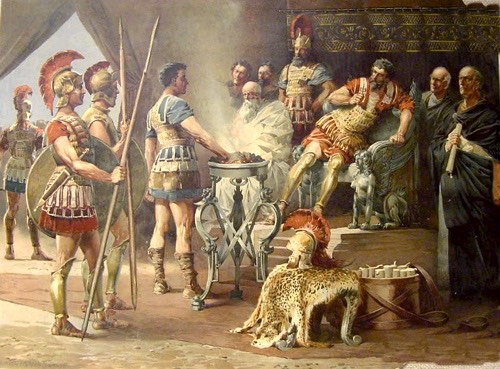January 21st, 2012
In 508 BCE the Romans succeeded in expelling their hated king Tarquinus, thereby marking the beginning of the Roman Republic. Unfortunately, Tarquinus had close kinship relationships with a number of Etruscan kings, and the Etruscans in those days were the dominant force in Italy. Tarquinus managed to cajole Lars Porsenna, the king of Clusium, into declaring war on Rome. Clusium was an Etruscan town about 80 miles north of Rome; it’s now called Chiusi and has a population of about 8,000, probably the same as it had back then. Let’s just say that time sorta passed by Clusium.
Anyway, Porsenna marched his army to Rome and laid siege to it. Things weren’t looking too good for Rome at this point. Rome was no big deal then; had King Porsenna succeeded, Rome would have disappeared into history without a trace. A young hothead by the name of Mucius came up with an idea so stupid it could only have been the product of desperation. He proposed to sneak into Porsenna’s camp and assassinate him. Mucius hadn’t given much thought to what might happen afterwards; had he succeeded, it is likely that Tarquinus would have assumed command of the army and pressed on to a much bloodier ending. But the Roman senators didn’t have any better ideas, so they told Mucius to go ahead.
Somehow he managed to get into Porsenna’s camp. However, at this point, Mucius blew it: he killed the wrong guy! Somehow he confused the king’s secretary with the king. He was seized and dragged before Porsenna. Realizing that his goose was cooked, Mucius assumed a defiant mien and declared that he came with the intention of killing Porsenna and he expected from the outset to die. At this point he got a little carried away with his own bravado, boasting that he was the first of 300 young Romans sworn to kill Porsenna by any means possible. And to show off just how tough he was, he stuck his right hand into the fire and held it there.
Had I been Porsenna, I would have burst out laughing at this silly young buck, but Porsenna seems to have been a good-hearted fellow and he was impressed by the bravery and determination of the young fellow. Accordingly, he sent Mucius back to Rome with a proposal to discuss peace terms. After some haggling, a peace was concluded and everybody lived happily ever after. The Roman Senate was so pleased with Mucius’ performance that they gave him some excellent farm land to live out the rest of his days. And they bestowed the cognomen Scaevola on him. It means “lefty”.

Mucius sizzles
